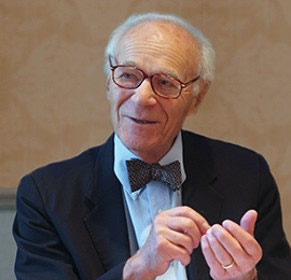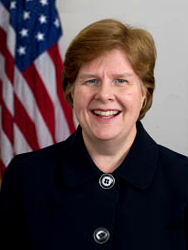Related Research Articles
In economics, a recession is a business cycle contraction that occurs when there is a general decline in economic activity. Recessions generally occur when there is a widespread drop in spending. This may be triggered by various events, such as a financial crisis, an external trade shock, an adverse supply shock, the bursting of an economic bubble, or a large-scale anthropogenic or natural disaster.
Business cycles are intervals of expansion followed by recession in economic activity. A recession is sometimes technically defined as 2 quarters of negative GDP growth, but definitions vary; for example, in the United States, a recession is defined as "a significant decline in economic activity spread across the market, lasting more than a few months, normally visible in real GDP, real income, employment, industrial production, and wholesale-retail sales." The changes in economic activity that characterize business cycles have implications for the welfare of the broad population as well as for private institutions. Typically business cycles are measured by examining trends in a broad economic indicator such as Real Gross Domestic Production.

Lawrence Robert Klein was an American economist. For his work in creating computer models to forecast economic trends in the field of econometrics in the Department of Economics at the University of Pennsylvania, he was awarded the Nobel Memorial Prize in Economic Sciences in 1980 specifically "for the creation of econometric models and their application to the analysis of economic fluctuations and economic policies." Due to his efforts, such models have become widespread among economists. Harvard University professor Martin Feldstein told the Wall Street Journal that Klein "was the first to create the statistical models that embodied Keynesian economics," tools still used by the Federal Reserve Bank and other central banks.

Arthur Betz Laffer is an American economist and author who first gained prominence during the Reagan administration as a member of Reagan's Economic Policy Advisory Board (1981–1989). Laffer is best known for the Laffer curve, an illustration of the theory that there exists some tax rate between 0% and 100% that will result in maximum tax revenue for government. In certain circumstances, this would allow governments to cut taxes, and simultaneously increase revenue and economic growth.
Alan Reynolds is one of the original supply-side economists.
Nariman Behravesh is Chief Economist at the consulting firm IHS Markit, and author of Spin-Free Economics: A No-Nonsense, Nonpartisan Guide to Today's Global Economic Debates.
Todd G. Buchholz is an American economist, author, inventor, and business consultant. He served as Director of Economic Policy under George H. W. Bush and as managing director of Tiger Management. Buchholz regularly contributes commentaries on political economy, financial markets, business and culture to media outlets such as The New York Times, The Wall Street Journal, and The Washington Post, as well as major television networks. In his work, Buchholz has devised a number of economic theories and policy proposals and frequently makes forecasts about major economic turns and developments.
Victor Zarnowitz was a leading scholar on business cycles, indicators, and forecast evaluation. Zarnowitz was Senior Fellow and Economic Counselor to The Conference Board. He was Professor Emeritus of Economics and Finance, Graduate School of Business, The University of Chicago, and Research Associate, National Bureau of Economic Research (NBER).
Charles L. Evans was the ninth president and chief executive officer of the Federal Reserve Bank of Chicago from 2007 to 2023. In that capacity, he served on the Federal Open Market Committee (FOMC), the Federal Reserve System's monetary policy-making body.

Christina Duckworth Romer is the Class of 1957 Garff B. Wilson Professor of Economics at the University of California, Berkeley and a former chair of the Council of Economic Advisers in the Obama administration. She resigned from her role on the Council of Economic Advisers on September 3, 2010.
David Hibbard Romer is an American economist, the Herman Royer Professor of Political Economy at the University of California, Berkeley, and the author of a standard textbook in graduate macroeconomics as well as many influential economic papers, particularly in the area of New Keynesian economics. He is also the husband and close collaborator of Council of Economic Advisers former Chairwoman Christina Romer.

Lawrence Alan Kudlow is an American conservative broadcast news personality, columnist, and political commentator. He is a financial news commentator for Fox Business and served as the Director of the National Economic Council during the Trump Administration from 2018 to 2021. He assumed that role after his previous employment as a CNBC television financial news host.

Mark M. Zandi is an American economist who is the chief economist of Moody's Analytics, where he directs economic research.

A. Gary Shilling is an American financial analyst and commentator who appears regularly in publications such as Forbes, The New York Times, and The Wall Street Journal. He is president of A. Gary Shilling & Co., Inc., editor of A. Gary Shilling's Insight, and a member of the Nihon Keizai Shimbun Board of Economists. He is featured frequently on business shows on radio and television, and as a recognised orator, addresses conventions of global business groups like the Young Presidents' Organization. More than two years before the housing bubble burst, Shilling warned that subprime loans were probably "the greatest financial problem" for the future U.S. economy, and in January 2006, prior to the 2008 recession, he wrote an article entitled: “The Housing Bubble Will Probably Burst”. In 2007 he correctly prophesied that housing would "sink the economy".

Timothy Joseph Kane is an American economist and president and founder of The American Lyceum, a non-profit organization that seeks to promote solution-focused, civic debate. Kane was the J-P Conte research fellow at the Hoover Institution, where he specialized in immigration reform. He is a former U.S. Air Force intelligence officer with two overseas tours of duty. After leaving the service, Kane explored a career in start-up technology firms while pursuing a Ph.D. in economics. After working as a teaching professor of economics, Kane served on the Joint Economic Committee of the U.S. Congress and was director of the Center for International Trade and Economics at The Heritage Foundation. Kane was also an editor of the 2007 Index of Economic Freedom, co-published by The Wall Street Journal and The Heritage Foundation, and is the author of the book Bleeding Talent: How the U.S. Military Mismanages Great Leaders and Why It's Time for a Revolution. Kane co-authored the book, Balance: The Economics of Great Powers from Ancient Rome to Modern America with Glenn Hubbard. Kane's latest book is The Immigrant Superpower: How Brains, Brawn, and Bravery Make America Stronger.
David D. Hale was an American economist and author. He was a member of the Council on Foreign Relations, and a recipient of the William F Butler Award from the National Association for Business Economics. Hale held a B.Sc. degree in international economic affairs from the Georgetown University School of Foreign Service and a M.Sc. degree in economic history from the London School of Economics.

Benjamin H. Harris is an American economist who is currently the Vice President and Director of the Economic Studies program at the Brookings Institution. Throughout his career, he has served in several public-service positions, most notably as the chief economist and chief economic advisor to Vice President Joe Biden from 2014 until the end of the Obama administration, and as Assistant Secretary for Economic Policy and Chief Economist of the U.S. Treasury. Harris was the executive director of the Kellogg Public-Private Initiative at the Kellogg School of Management at Northwestern University, the Chief Economist to the evidence-based policy organization Results for America, and the founder of the economic policy consulting firm Cherrydale Strategies. He has been a frequent contributor to The Wall Street Journal and regularly appears on cable television to discuss macroeconomics and public policy.
Ellen Hughes-Cromwick is an American economic advisor serving as a senior economist at the University of Michigan Energy Institute. She previously served as the chief economist for Ford Motor Company for over 18 years, and oversaw the company through the 2008 financial crisis. Hughes-Cromwick has been involved with the National Association for Business Economics for over a decade, and served as the association's president from 2007 to 2008.
Casey B. Mulligan is an American economist and author. He is a Professor in Economics at the University of Chicago. He served as chief economist for the Council of Economic Advisers in the Trump Administration from September 6, 2018 to August 2019.
Constance L. Hunter is an American chief economist and macroeconomics analyst. She is a former principal and chief economist at KPMG, and has served as president of the National Association for Business Economics (NABE). A member of several think tanks, including the Council on Foreign Relations, she is among the first economists to forecast various historic economic events, including the 2001 dot-com bubble, the 2007–2008 mortgage and credit crisis, and the economic impact of the COVID-19 pandemic.
References
- ↑ "Brian Wesbury | The American Spectator". Spectator.org. Archived from the original on 2013-09-17. Retrieved 2014-08-27.
- ↑ "wesbury - CNBC". Search.cnbc.com. Archived from the original on 2016-12-20. Retrieved 2014-08-27.
- ↑ "Search for wesbury". Foxbusiness.com. Archived from the original on 2015-09-24. Retrieved 2014-08-27.
- ↑ "Search for wesbury". Fox News.
- ↑ "wesbury - Bloomberg Search". Bloomberg. Archived from the original on 2014-09-03.
- ↑ "Rock Bridge High School". Columbia.k12.mo.us. Archived from the original on 2014-05-20. Retrieved 2014-08-27.
- ↑ "Brian Wesbury, Nationally Renowned U.S. Economic Forecaster, Joins The Heartland Institute as Senior Fellow". Heartland Institute / Heartland.org. Retrieved 2014-08-27.
- ↑ "New Era of Wealth How Investors Can Profit from the 5 Economic Trends Shaping the Future Later Printing: Amazon.com: Books". Amazon. 1999-01-01. Retrieved 2014-08-27.
- ↑ "Top 10 economic forecasters". USA Today. March 29, 2004.
- ↑ "Economic Forecasters Expect Moderate Recovery in 2002 - Wesbury Led a Group Of Bears Who Called The Recession of 2001". Camillieconomics.com. 2002-01-04. Archived from the original on 2013-02-13. Retrieved 2014-08-27.
- ↑ Wesbury, Brian S. (9 November 2009). It's Not as Bad as You Think: Why Capitalism Trumps Fear and the Economy Will Thrive: Brian S. Wesbury, Amity Shlaes: 9780470238332: Amazon.com: Books. ISBN 978-0470238332.
- ↑ "Archived copy" (PDF). Archived from the original (PDF) on 2015-09-24. Retrieved 2010-12-17.
{{cite web}}: CS1 maint: archived copy as title (link)